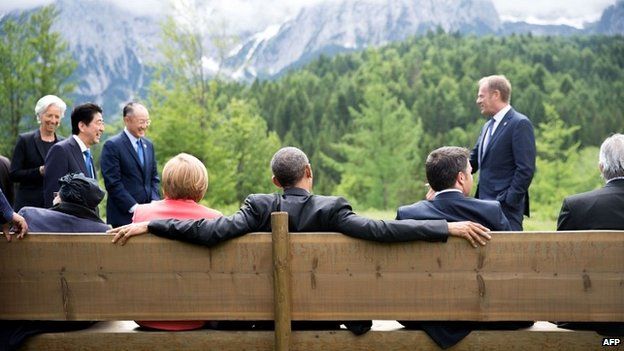
By Esther Opaluwah
G7 leaders today agreed that the global economy must be decarbonised this century in order to avoid the worst impacts of climate change. Speaking in Bavaria, Germany, the Group of Seven industrial powers averred that the world should phase out fossil fuel emissions in line with scientific findings which state that “deep cuts in global greenhouse gas emissions are required with a decarbonisation of the global economy over the course of this century”.
Chancellor Merkel said on Monday that the G7 leaders committed themselves to the need to “decarbonise the global economy in the course of this century.” She had earlier urged the G7 to agree on the goal so it can be forwarded to Paris climate conference by December this year.
Decarbonising refers to ending the use of oil, gas and coal and replacing them with alternative sources of energy such as wind and solar power. The continued usage of carbon-based fuels such as oil and gas is largely responsible for global warming as it releases carbon dioxide into the atmosphere.
Considered a historic decision and a major boost in the fight against climate change, the decision points to the possible end of the fossil fuel era and the dawning of the unstoppable age of renewables. Accepting to cut greenhouse gases by 40 to 70 per cent by 2050 from 2010 levels, Canada, France Germany, Italy, Japan, UK and US must now increase the ambition of their domestic climate plans, so as to do their fair share of meeting this global goal.
The German chancellor, said the cuts would have to be at the upper end of this target because “40 per cent is clearly not enough”. The leaders also reaffirmed a pledge to mobilise $100bn a year from public and private sources by 2020 to help poorer nations tackle climate change.
Streamlined text from Bonn
Meanwhile ongoing negotiations in Bonn today saw countries acknowledging the need to step up the pace of efforts to craft a streamlined, manageable text that outlines clear options for the post-2020 climate agreement due to be adopted in Paris this December. There was an unprecedented, united call by countries for the co-chairs who are managing these negotiations to put forward their own draft text later this week.
This is with a view to enabling ministers meeting in Paris next month to give political guidance on key issues in the negotiations, such as ambition, fairness, transparency and finance.
Cautious optimism from civil society
Welcoming the decision with cautious optimism, climate justice activists agreed that the decisions taken by the world’s wealthiest democracies would boost negotiations among nearly 200 countries aimed at finalising a global climate deal in Paris in December but wondered why “G7 leaders still aren’t spelling out how they will keep their $100bn promise by 2020. They’ve failed to commit to increase public funds, which is a vital foundation for success in Paris at the end of the year.”
Oxfam’s Tim Gore said “developing countries need a credible financial roadmap, not a set of accounting tricks. Thankfully Angela Merkel has bucked the trend. Her pledge to double climate finance from Germany has set the bar for the others – now the rest must follow suit. Currently rich countries provide just 2% of what poor countries need to adapt to a changing climate.”
“The course is right, but more speed, ambition and specific actions are needed. Developing countries are ready to move fast and far on renewables, but they need finance and technology from rich countries to do it. We need to see more of these concrete commitments for immediate action. We also want to see them shifting investment towards low-carbon technologies in their own countries.” Samantha Smith, leader of WWF’s Global Climate and Energy Initiative added.
For CAN Japan’s Kimiko Hirata, “Japan clearly tried to play a spoiling game at the G7, but German Chancellor Angela Merkel’s leadership shone through. The experience should prove to Prime Minister Shinzo Abe that his position on climate and coal is at odds with the rest of the leaders. He should reconsider its position in run up to the Paris Climate Talks in December.”
“Heading into the G7 summit Chancellor Merkel’s announcement that Germany will double its climate finance contribution to $4 billion was big news for the developing world. We saw this as a positive benchmark that could have been a game-changer. Unfortunately, other G7 leaders missed the opportunity during their summit in Elmau to reach the bar set by Germany. Their acknowledgement of the need to provide climate finance after 2020 was an improvement on previous positions but we urgently need a roadmap to the pledged $100billion. These countries still have plenty of opportunity between now and Paris to step up to the plate,” Anoop Poonia CAN South Asia advised.

With activists finding it difficult to send their messages to the G7 leaders, who are tucked away in a secluded Alpine valley guarded by thousands of police, Greenpeace projected its demands onto a nearby mountain using green lasers to beam the words “G7: 100% ERNEUERBARE ENERGIENI”meaning “G7: Go for 100 per cent renewables” onto the side of the Zugspitze, Germany’s highest peak.
Martin Kaiser of Greenpeace said “Elmau delivered. At the close of the G7 discussion today in Elmau the vision of a 100% renewable energy future is starting to take shape while spelling out the end of coal. The heavy lifting for German Chancellor Angela Merkel will begin when she returns to Berlin and has to present a plan for complete phase-out of the dirtiest energy source, coal. Then she would live up to her name as the ‘climate chancellor’.”










